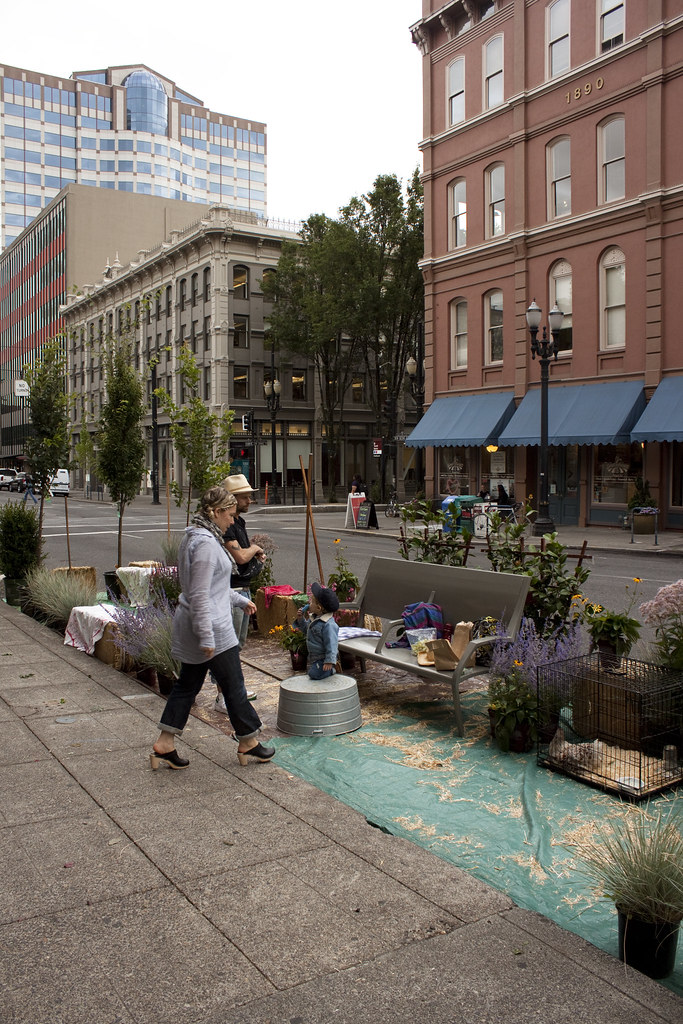Via gardensinunexpectedplaces:
Via steveleathers:
For PARK(ing) Day, my company created an Urban Farmlet on SW 2nd Street in Portland (between Taylor and Yamhill).
It’s only two parking spots, but it feels like a lot more. If you’re in the area, come by and check it out. Have some lemonade. Enjoy some space that you normally wouldn’t have the chance to.
Happy 2011 PARK(ing) Day, y’all.
PARK(ing) Day is an annual, worldwide event that invites citizens everywhere to transform metered parking spots into temporary parks for the public good.
Click here to view a map of cities where residents have set up pop-up parks.
See also: Earlier Gardens in Unexpected Places post here.
Today, in “things I love.”
Via unconsumption:
It’s wine o’clock (somewhere) — time to share a wine-related repurposing find:
Wine corks used as plant markers! (spotted on Pinterest)
For additional wine-spiration, check out earlier Unconsumption posts here.
Cheers!
Today in things I love.
Via (me on) unconsumption:
“A funny thing happened after Keiji Asakura suggested the creation of a vegetable garden in the middle of the concrete corridor and skyscraper canyon that is downtown Houston.
“It actually came to fruition — with a swiftness that stunned the landscape architect and the nonprofit group [Urban Harvest] that shared his vision.
“Now, a mere two months later, herbs, vegetables and flowers are flourishing on a bustling city street. A community has been forged among co-workers and strangers who once did little more than brush shoulders on crowded elevators. Skateboarders and street people have grown protective of the fledgling plants.
“And this experiment, which involves nonprofit groups, the city’s Sustainability Office and employees of the Department of Public Works and Engineering, has become living proof that urban gardens can take root in the unlikeliest of places.
“The ‘Downtown Houston Container Vegetable Garden Project’ is … part of a trend in cities across the country, where once-vacant lots, apartment building windowsills and rooftops are being turned into community gardens which help provide fresh produce for the gardeners, farmers markets, and for food banks serving the needy.
“We haven’t heard of any other city doing this the way we have,” said [the city’s new sustainability director Laura] Spanjian. “The goal is to show people that they can grow local vegetables anywhere. We want to be a model for other cities and other businesses.”
“It adds greenery and beauty in an unexpected place,” said [Derrick] Neal [of the Public Works Department]. “This is what gardening is about — totally ordinary people doing extraordinary things.”
Full story: Urban Gardening Experiment Blossoms in Houston - ABC News
Other community garden/urban farming posts here, here, and here.
Reposting my unconsumption post:
Grocery Getters: The Farm Proper Plants Real Food in Shopping Carts — FastCompany.com
Alissa Walker writes:
Urban farms are sprouting in vacant lots and forgotten walls all over the country. But a farm in San Diego, California employs another type of abandoned real estate: The shopping cart. Firms Set & Drift and mi-workshop have used a signature blight on the urban landscape to create a mobile garden concept called The Farm Proper in the city’s Barrio Logan neighborhood.
Abandoned carts gathered from the neighborhood have been lined with burlap sacks donated by a local coffee retailer and packed with plants. Carts deemed inoperable have been anchored permanently at the space, and in this case, planted into a kind of bean pole teepee. The image of the supermarket staple serving as a planter for fresh food serves up some pretty nice symbolism as well.
It’s the meals-on-wheels element that really makes this kind of gardening exciting. One can imagine how banged-up carts could be collected from the streets, brought here for planting and then be wheeled away to permanently park at the homes of deserving families. Another idea, which was already demonstrated at a Farm Proper potluck, could bring healthy lunches to local workers: With the proper combination of crops, these mobile carts could roam the streets as super-fresh, pick-your-own salad bars.







